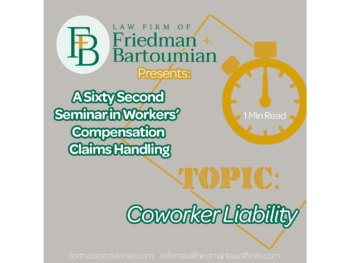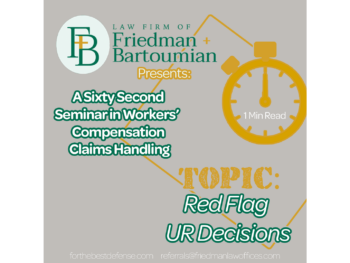
There are times when an applicant’s attorney will offer a claims administrator the opportunity to quickly settle future medical benefits in a very old workers’ compensation claim. Such an offer should be viewed as a red flag warning to the administrator that something may not be right.
We usually see a request for a quick settlement of future medical when an applicant is either very ill or planning to leave the country forever. We urge all claims handlers to beware if you ever encounter either of these situations:
- An applicant has actively used a future medical award for years, but now wishes to settle quickly; or
- An applicant’s attorney requests an MSA allocation, and then offers to quickly settle future medical based on the allocation without CMS approval, while offering to hold the employer harmless.
With a little research a claims administrator may quickly discover the reason behind a quick settlement offer. One astute third-party administrator automatically schedules a medical examination with a physician of their choice whenever either of the two above scenarios occur. The examination is not with a QME, but with a doctor of their choice, as they simply wish to determine whether the patient is healthy or very ill. Should the applicant object to a medical examination, the administrator simply declines to settle the case. In exchange for a mere $250 examination fee, the administrator may end up saving tens of thousands of dollars in settlement money, as there is no need to pre-pay lifetime medical benefits to a terminally ill patient.
Sometimes an applicant intends to leave the United States to live the rest of their life in their native homeland. Before departing, they request to quickly settle future medical but only after the employer obtains an MSA allocation, where future medical expenses are projected using a worse-case scenario formula. However, because medical treatment provided outside the United States is not compensable under Medicare, there is no need for a claims administrator to obtain an MSA allocation – it’s an inappropriate standard to use to determine settlement value. Instead, an administrator is free to determine reasonableness without Medicare constraints.
We do wish to offer one final piece of advice. Under no circumstances should a claims administrator agree to hold harmless an applicant in exchange for not submitting an MSA allocation to CMS. That’s because CMS does not recognize hold harmless agreements as valid! The Medicare conditional payment contractor is free to pursue collection against any responsible party, including claims administrators and their attorneys, for recovery of medical payments that would otherwise have been covered under an approved MSA. A hold harmless agreement is not worth the paper it’s written on!









 When Horseplay Pays: A Sixty-Second Seminar in Workers’ Compensation Claims Handling
When Horseplay Pays: A Sixty-Second Seminar in Workers’ Compensation Claims Handling
Leave a Reply